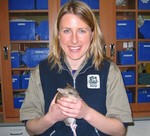Pathogenicity of Newcastle Disease
Published: February 18, 2013
By: Poultry CRC
 The Poultry CRC continues to attract exemplary PhD candidates. One of our latest recruits, veterinarian Dr Jemma Bergfeld (based at CSIRO’s Australian Animal Health Laboratory [AAHL]) is set to unravel the mechanisms underlying Newcastle Disease (ND). Caused by virulent strains of avian paramyxovirus type 1 (APMV1), this devastating and highly contagious virus is regarded as one of the most important diseases affecting poultry globally. Previous outbreaks of virulent Newcastle disease virus in Australia have been associated with high economic and social costs, not to mention the welfare impact on the birds themselves.
The Poultry CRC continues to attract exemplary PhD candidates. One of our latest recruits, veterinarian Dr Jemma Bergfeld (based at CSIRO’s Australian Animal Health Laboratory [AAHL]) is set to unravel the mechanisms underlying Newcastle Disease (ND). Caused by virulent strains of avian paramyxovirus type 1 (APMV1), this devastating and highly contagious virus is regarded as one of the most important diseases affecting poultry globally. Previous outbreaks of virulent Newcastle disease virus in Australia have been associated with high economic and social costs, not to mention the welfare impact on the birds themselves.Jemma explains, “I am investigating the molecular basis for the virulence of APMV1 to determine why the virus is pathogenic in some animals and not others. We will also explore the molecular basis of the low pathogenicity exhibited in poultry by ND isolates that are reportable to the World Organisation for Animal Health (OIE).” Of particular interest is why the pigeon paramyxovirus type 1 (PPMV1) strain does not appear to be pathogenic in chickens, even though it shares a similar genetic makeup and sequence with APMV1.
A number of Australian ND virus isolates that are already held at AAHL will be used throughout the project. “We will be using reverse genetics to work out which genes or combination of genes are the main determinants of virulence”, said Jemma. “These techniques will be used to construct ND viruses with exchanged N, P, M and L proteins. The effects of each of these proteins on pathogenesis will be explored using histopathological and immunohistochemical techniques, along with virus isolation, polymerase chain reaction and serology.” Full genome sequencing of the viruses will also be undertaken.
Newcastle disease is an important biosecurity threat to Australia, and poses major difficulties in poultry production in developing countries. An outbreak of Newcastle disease in Australia would have serious overseas trade implications. Along with PPMV1, other strains of ND circulate in wild birds throughout Australia. Jemma’s research will result in better detection methods for ND, and a greater understanding of the potential emergence of ND outbreaks in Australia.
Source
Poultry CRCRelated topics:
Mentioned in this news release:

Recommend
Comment
Share
Recommend
Reply

Would you like to discuss another topic? Create a new post to engage with experts in the community.

